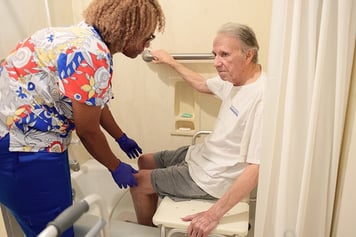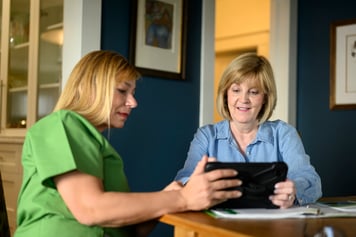Social isolation is common among the elderly and can be detrimental to their health and well-being. Research links loneliness to a wide range of health problems such as heart disease and depression. However, people who are involved in meaningful activities with others tend to live longer and have a stronger sense of purpose.
In 2023, the US Surgeon General raised an alarm: a nationwide increase in loneliness has become a public health crisis. For older adults, this is especially true, with 43% of those age 60 and older reporting loneliness.
Why Are Seniors Lonely?
As social creatures, we need connection with others. However, seniors often experience fewer social interactions as they age. There are several reasons for this:
- Fewer interactions with colleagues due to retirement.
- Smaller support networks due to losses throughout life, such as the death of a spouse or a close friend.
- Changes in mobility, health, and the ability to drive safely can make it harder to visit friends and family, especially those who live further away.
- Daily tasks like getting dressed and preparing meals can take a lot of effort, limiting energy left for socializing.
- Senior caregivers juggling various responsibilities often can’t meet all their loved one’s social needs.
Effects of Loneliness on the Elderly
Loneliness takes a heavy toll on the elderly, both mentally and physically. For example:
- Research shows loneliness increases the risk of functional decline. This means it’s harder to do daily activities like bathing, dressing, eating and walking.
- High blood pressure, obesity, heart disease, Alzheimer’s disease and other health conditions have been linked to loneliness.
- Higher stress levels can increase inflammation in the body and weaken immune responses. This can increase the risk of illness.
- Lack of mental stimulation can lead to faster cognitive decline.
- Lonely seniors are more likely to engage in unhealthy behaviors such as skipping exercise, eating poorly, and using drugs or alcohol.
- Loneliness can have effects on emotional health similar to being under chronic stress. This can lead to anxiety, depression or other mental health issues.
- Being lonely in old ages has been associated with a higher risk of death in several studies. The risk is on par with light smoking and exceeds the risks from obesity and high blood pressure. By comparison, strong social relationships can increase the likelihood of survival by as much as 50%.
Signs of Loneliness in the Elderly
Your loved one may not realize they’re lonely. If they do, they may not want to admit it. The warning signs of loneliness in the elderly aren’t always obvious. Look for the following signs:
Loss of friends or family
Has your loved one’s social circle shrunk due to friends or relatives moving or passing away?
Change in abilities
Has your loved one recently lost their ability to drive or access transportation? Did they have a surgery or injury or develop a health condition that limits their ability to get out and interact with others?
Difficulty sleeping
Does your loved one seem more tired than usual or complain about lack of energy?
Unhealthy habits
Have you noticed your loved one choosing unhealthy foods more often, skipping meals, getting less exercise, spending money excessively or engaging in other unhealthy behaviors?
Change in behavior
Does your loved one tear up or get irritated easily? Have they started calling you more, or less, often?
Time at home
Is your loved one spending an increased amount of time home alone?
[action 1]
How to Alleviate Elderly Loneliness
It only takes one or two social outlets to help seniors feel more connected. Here are a few ideas that can help:
Understand Their Needs
About 28% of older adults in the U.S. live alone. Spending a lot of time alone doesn’t mean someone is lonely, and people can be lonely even when surrounded by others. “Many older adults are used to spending a lot of time home alone,” says Sullivan, “but they still could use some help staying connected.”
Talk to your loved one so you can understand if they’re struggling with senior isolation. They may not volunteer their difficulties unless you ask directly about things you’ve noticed or offer specific help. Some barriers to social interaction are easy to solve, such as getting a hearing aid for an older adult who has a hearing deficit.
Pick up the Phone
It’s hard to find time in our busy lives, but a few minutes can make a big difference to a lonely senior. “Set up phone calls with family members, ideally every day,” says Sullivan. “Staying in close contact can create the feeling of togetherness even if you can’t physically be together.” If your loved one has a smartphone, tablet or computer, you could also try a video conferencing call, email or text. Or there’s always good old-fashioned letter writing.
Acknowledge Losses
Grief and loss are natural and normal parts of life and the aging process. Both death and non-death losses, such as the loss of independence, can lead to feelings of loneliness. However, grief can be challenging for some people to discuss because it deals with emotions and doesn’t have a solution.
Start the conversation by acknowledging their losses, listening more than speaking, and respecting their experience is unique. It can feel uncomfortable at first, but creating a space for your loved one to share these feelings can help them feel supported, reduce feelings of isolation, and promote positive coping skills.
Learn Something New
Older adults have a lifetime of knowledge and experience. Tap into it by asking your loved one to teach you or another family member something. Maybe they could teach you how to knit, play an instrument or speak another language. Not only will they feel valued and appreciate your time, you’ll develop new skills and memories you can hold on to for a lifetime.
Help Them Adopt a Pet
A pet can provide unconditional love and companionship. If your loved one is interested in (and can care for) a pet, the attention and support can feelings of loneliness.
Encourage Exploring Old or New Hobbies
Having a favorite pastime can guard against senior isolation, especially if it’s a hobby that involves other people. If your loved one doesn’t have any hobbies, ask them about what they used to enjoy doing. Is there something they always wanted to do, but never explored? Even if it’s a modified version, adapted to their current level of functioning, it’s worth exploring ways to bring former —and new! — passions into their life. For example, if your loved one used to be an avid gardener but has lost some mobility, a window garden, a gardening club or online group may be an option.
Find Local Resources
There are resources in most communities geared toward alleviating elderly loneliness. Sullivan recommends contacting senior centers, churches or other religious organizations, transportation services, or meal support providers like Meals on Wheels. You also may be able to find a book club or a local group of seniors that gets together to play cards, Bingo or other games.
Look for Volunteer Opportunities
Volunteering can be a rewarding way to alleviate elderly loneliness. Working for a greater cause can help seniors develop a sense of community and is a good way to socialize with people with similar interests. There are many kinds of volunteer opportunities. Help them find a good fit by matching up opportunities with their interests, abilities, and availability. Some volunteer opportunities include:
- Helping within a community or neighborhood by cleaning up a park, assisting at a food bank, or putting on an event.
- Mentoring or tutoring at a school or library
- Assisting hospitals, nursing homes or hospice companies like Amedisys in providing companionship support or helping with administrative tasks.
- Providing support to a religious organization, museum, or rescue by offering administrative and functional support.
Visit
As often as you can, stop by for a visit. Ask about their day and actively listen. If they enjoy getting out, take them out for lunch or to a favorite place. “Even just playing games, doing puzzles or drawing together can be a welcome change of pace during the day,” says Sullivan.
Help Them Find a Class to Take
Education is a great way to learn new skills and get to know other people with similar interests. Talk to your loved one about options that might interest them, such as computer skills, art or music, gardening or a fitness class such as yoga or tai chi.
Get Help to Overcome Loneliness
If you’ve tried some of these approaches and you still see signs of loneliness in your elderly loved one, get help. Cognitive behavioral therapy, or “talk therapy” with a therapist, has proven effective for reducing senior loneliness as well as anxiety and depression.
If your loved one’s doctor determines they’re eligible, home health care may be an option. Home health can include visits from nurses, home health aides, and physical, speech and occupational therapists. An in-home caregiver may also be an option that can help address social isolation in the elderly.
Loneliness Doesn’t Have to be Part of Growing Old
Senior loneliness isn’t an inevitable part of aging. At any age, we need people in our lives who care about us, will laugh with us and help us through difficult times. Identifying the signs of loneliness, talking about it openly, and finding ways to build and strengthen connections can enhance quality of life. Even if your loved one has a health condition or other issue that keeps them home, there are ways to stay connected. Just a couple social interactions per week can make a real difference in their physical and emotional health.
If you’re wondering if home health would help your loved one improve their physical health as well as reduce isolation, you can explore our FAQs or contact us today for any questions.
Lisa Glissman-Mayner is the Director of Bereavement Services for Amedisys, ensuring families of hospice patients receive the support they need after the passing of their loved ones. She is a Certified Social Worker in the state of Nebraska and has more than 16 years of bereavement care experience.





